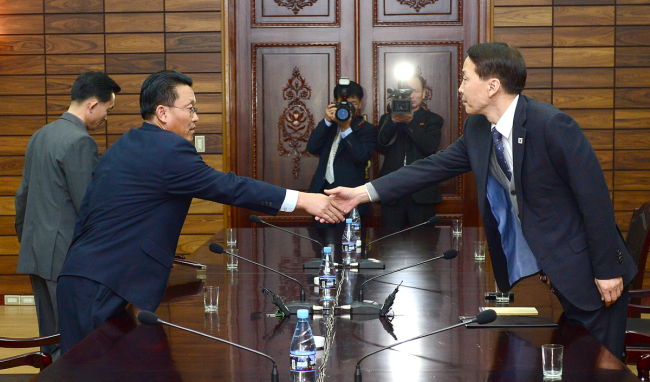The two Koreas on Thursday held a working-level meeting to arrange high-level government talks, amid concerns that Pyongyang’s continued criticisms against Seoul’s policies could hamper the budding mood for dialogue.
 |
Kim Ki-woong (right), assistant minister of South Korea’s Unification Ministry’s Special Office for Inter-Korean Dialogue, shakes hands with Hwang Chol (left), a senior official of the North’s Committee for Peaceful Unification of the Fatherland before their talks in Tongilgak on the North Korean side of the border village of Panmunjeom on Thursday. (Yonhap) |
Three senior officials from each side discussed the venue, date, level of representatives and agenda for the high-level talks. The meeting was held at Tongilgak, a building on the North Korean side of the inter-Korean border village of Panmunjeom.
Under the comprehensive Aug. 25 deal that brought the two Koreas from the brink of an armed clash following Pyongyang’s landmine attack on Aug. 4, they agreed to hold government talks in Seoul or Pyongyang “at an early date.”
The working-level talks began at around 12:50 p.m. -- more than two hours later than they were initially scheduled to begin due to “technical issues” regarding the setting up of communication lines, according to Seoul’s Unification Ministry.
At the meeting, the South Korean side was represented by Kim Ki-woong, assistant minister of the ministry’s Special Office for Inter-Korean Dialogue, while the North’s delegation was led by Hwang Chol, a senior official of the North’s Committee for Peaceful Unification of the Fatherland.
The first round of the meeting, where the two sides explained their respective positions, lasted 90 minutes. The two sides resumed their talks later in the afternoon.
South Korea’s Unification Minister Hong Yong-pyo said that Seoul’s negotiators would engage in the talks to “prop up the momentum” from the Aug. 25 agreement.
“We will engage in the talks to achieve the results that can be accepted by our people,” he added.
A day earlier, the Rodong Sinmun, the daily of the North’s ruling Workers’ Party, criticized the South for “scurrying to harm the North in cahoots with foreign forces.”
“There has been no change at all in South Korean authorities’ stance since the August agreement,” the daily said. “While speaking of dialogue and cooperation, it has been scurrying to harm the North.”
Observers say that the North’s criticism appeared intended to pressure the South to make more concessions in the working-level talks.
An issue at stake at the meeting was the level of each representative for the high-level talks.
Seoul has wanted to hold talks between its Unification Minister Hong and Kim Yang-gon, the chief of the Workers’ Party’s United Front Department that handles inter-Korean affairs.
But Pyongyang has reportedly sought to hold talks between Hong and the chief of the secretariat of the Committee for Peaceful Unification of the Fatherland, an organization that Seoul does not see as equivalent to its Unification Ministry.
Pyongyang believes that Kim Yang-gon, a secretary of the party, is an official higher than Seoul’s unification minister.
The two Koreas also have different sets of priorities for the agenda of the high-level dialogue.
Seoul prioritizes setting the issue of families separated since the end of the 1950-53 Korean War. But Pyongyang has sought to address the issue of Seoul’s economic sanctions against it and the resumption of the long-stalled tours to Mount Geumgangsan.
The working level talks were held after Pyongyang rejected Seoul’s overtures for the talks three times, arguing that Seoul authorities had not been sincere about dialogue. The communist regime repeatedly criticized various issues, including South Korean civic groups’ dissemination of anti-Pyongyang leaflets and Seoul’s criticism of the North’s human rights conditions.
By Song Sang-ho (
sshluck@heraldcorp.com)








![[Today’s K-pop] Blackpink’s Jennie, Lisa invited to Coachella as solo acts](http://res.heraldm.com/phpwas/restmb_idxmake.php?idx=644&simg=/content/image/2024/11/21/20241121050099_0.jpg)